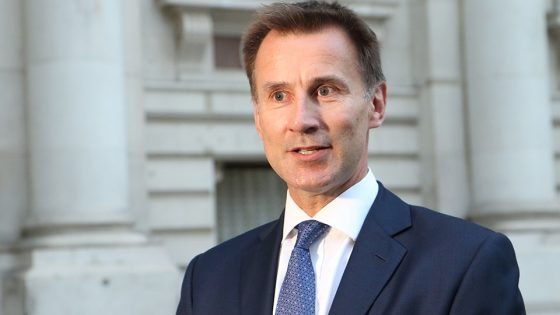Chancellor Jeremy Hunt (pictured) has dismissed media reports that the HS2 megaprojectcould scrap its Euston terminus to save money.
TheSun claimed that the overall HS2 programme faced a potential delay of up to five years, adding that officials could decide to trim costs on the project by cancelling or delaying until 2038 the plan to create the southern terminus at Euston Stationrunning services to and from west London’s Old Oak Common instead.
In a BBC News interview following a speech on the economy, Hunt said that he did not “see any conceivable circumstance” in which HS2 would terminate anywhere else than Euston.
Asked by Construction News to respond to the initial report, the Department for Transport was less emphatic than the chancellor, merely noting that the government “remains committed to delivering HS2 to Manchester, as confirmed in the Autumn Statement” in November.
The government’s official position remains that HS2 will improve connectivity and rail capacity, while also meeting its twin policy goals of levelling up regional economies and delivering greener transport.
“We are pleased that the chancellor has confirmed HS2 will connect to London Euston as planned,” Civil Engineering Contractors Association director of operations Marie-Claude Hemming told CN.
“The UK Government is right to hold its nerve in the face of current inflationary pressures and commit to the delivery of the scheme in full,” she added.
Official estimates put the cost of phases 1 and 2a of HS2 at £42.5bn, plus £17bn for the western part of phase 2b – but these figures do not take into account the current wave of inflation.
The completion of phases 1 and 2a is scheduled for 2029-33.
Although Hunt was clear today that HS2 will run into central London, and he reaffirmed the government’s commitment to the programme in November, material-price inflation is fuelling cost debates in Westminster.
Rail minister Huw Merriman is a strong advocate for HS2, recently telling CN: “I’m always disappointed when people question whether the project is going ahead.”
However, there are signs that this ambition is running up against hard reality as HS2 continues to come under significant cost pressure. Merriman warned earlier this month: “HS2 is currently experiencing very high levels of inflation. Following the Autumn Statement, we are working through how to manage the impact of inflation and will set out any changes in due course.”
Hemming argued that near-term pressures brought about by inflation should not override a “visionary commitment to the wider picture of the economy’s needs in the long term”.
A spokesperson for the High Speed Rail Group – whose members include a number of HS2 contractors – said that scrapping the Euston terminus “would be the height of folly”, adding: “The construction site is already very well progressed. Works have been underway there for five years and already hundreds of millions have been spent.
“Old Oak Common station has nowhere near enough platforms to serve as the London terminus. Indeed, if it was, there would only be enough capacity to allow London-Birmingham shuttle services on HS2. In very simple terms, if Old Oak Common is the terminus, you cannot have HS2 services reaching Manchester. If you cut off Euston, you also cut off Manchester and the rest of the North.”
Referring to the speculation that Euston could be delayed, the spokesperson acknowledged “you may save some money in the very short term” but a delay in construction would “actually add to the overall cost” as inflation crept in.
“We need to take a long-term view and build HS2 in full,” they added.
Northern Powerhouse Partnership chief executive Henri Murison also argued that Old Oak Common lacked the platform capacity to deliver a full service to Manchester, “never mind to Leeds and beyond”.
He added: “The problem with whittling down major infrastructure projects such as HS2 and Northern Powerhouse Rail is that the new, cheaper versions do not deliver the productivity transformation we were promised and, ironically, are less good value for money. It’s a false economy, and there are more sensible ways to address the issue of inflation in costs – which is occurring across all major construction projects.”
The Sun report echoed the findings of a Policy Exchange paper called HS2: The Kindest Cut Of All,written by Andrew Gilligan and published in November last year.
Gilligan, a long-time opponent of HS2, argued that the network should be pared back to a connection between Birmingham and Old Oak Common – taking Euston out of the equation and removing links north of Birmingham.
“Many of the benefits of HS2, such as they are, would still be delivered by such a scheme, and the benefit-cost ratio is better than for the full project,” the report stated.
The Old Oak Common terminus could save up to £5bn if land earmarked for the Euston development was also sold, and Gilligan argued that cancelling Euston would save an additional £1.7bn.
Despite Hunt’s confirmation of support for HS2, opponents of the project remain motivated. Lord Tony Berkeley, a Labour peer who served in 2019 as deputy chairman of the Oakervee Review into HS2, is a long-standing opponent of the programme and told the Press Association today: “I think the whole thing should be cancelled.”
Earlier this month in the House of Lords, he said there was a “three-year delay at Euston” and argued that HS2 is a “£161bn white elephant” that soaked up funding that would be better spent on infrastructure in the North and Midlands.
In his economic speech this morning, Hunt called for companies in the fields of digital technology, green industries, life sciences, advanced manufacturing and creative industries to increase their investment in the UK.
He said: “If anyone is thinking of starting or investing in an innovation or technology-centred business, I want them to do it in the UK. I want the world’s tech entrepreneurs, life-science innovators, and clean-energy companies to come to the UK because it offers the best possible place to make their vision happen.”








